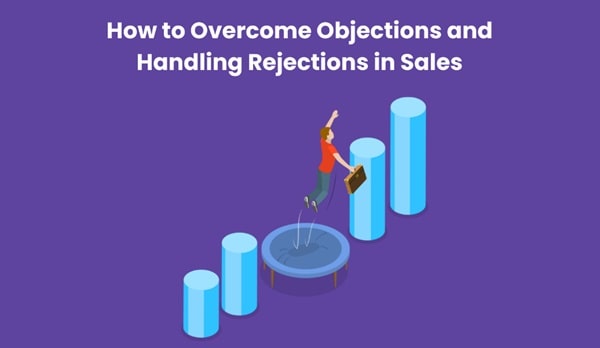In sales, objections and rejections are part of the course. As a sales professional, mastering the art of handling objections and rejections is essential to succeed. Sales skills are more than just knowing how to pitch a product or service; they also involve effectively addressing the concerns and reservations potential customers may have. In this blog, we’ll explore strategies on how to overcome objections and handle rejections in sales, providing valuable insights that can benefit both newcomers and seasoned sales professionals. If you’re eager to refine your Sales Skills or considering enrolling in a Sales Course, read on to discover essential techniques for navigating the challenging aspects of sales.

Understanding Objections and Rejections in Sales
Let’s define these words in the context of sales before moving into techniques for overcoming objections and managing rejections.
These are apprehensions or worries voiced by prospective clients during the sales process. These might have to do with the actual product or service, its cost, appropriateness, or other elements that cast doubt on the customer’s mind.
Rejections happen when a prospective buyer just says no to completing the transaction. Rejections signify a more definite determination not to purchase, while objections are often addressed and overcome.
Mastering Objection Handling
It’s important to pay attention to what a prospect has to say when they voice an issue. Allow them to finish speaking without interjecting. This not only demonstrates your respect for them, but it also clarifies their point of view for you.
- Recognise and express empathy for the prospect’s worries. You create a more cordial environment and generate rapport by doing this.
- Ask open-ended inquiries in order to get more information. This enables you to more successfully answer the problem by helping you identify its precise nature.
- Write answers that highlight the benefits that your item or service provides. Describe how it can solve the prospect’s particular problems and how it handles them.
- It might be effective to provide client testimonials or instances of how your product or service has helped other people. It may ease concerns and provide evidence of its practical worth.
- Occasionally, complaints stem from certain phrases or aspects of the product. In these situations, think about providing concessions or other options to meet the demands of the prospect.
- Once the objection has been addressed, proceed with confidence to close the deal. Restate the advantages and worth of your proposal, and request a commitment to proceed.
Effective Handling of Rejections
It’s critical to remain professional even when you’re rejected. Show thoughtfulness and politeness by thanking the prospect for their time.
- Request information politely about the reasons the prospect decided against moving further. This may provide insightful information that might help you better your sales strategy in the future.
- Not all rejections are conclusive. Prospects may want further time or information before making a choice. Remain in contact and provide help as needed.
- View rejections as stepping stones to success. Examine what went wrong and how you may make improvements to your approach in the future.
- Rejection is a part of the work, and sales may be difficult at times. Resilience building is essential. Remember that on their way to success, even the most prosperous salespeople have to overcome rejection.
The Importance of Sales Courses
To improve your sales abilities and get efficient techniques for managing objections and rejections, take sales classes. These courses are intended to provide you with the skills, tactics, and useful information you need to succeed in sales. They cover a wide variety of subjects, including sophisticated sales techniques, buyer psychology, and communication and negotiating abilities.
Sales courses offer the following benefits:
- Sales courses provide a systematic and planned approach to acquiring fundamental sales abilities, guaranteeing that you cover every important facet of the industry.
- You gain from the knowledge and experience of seasoned trainers and salespeople who can provide you with advice and practical examples.
- To provide you with real experience in managing rejections and objections, a lot of sales courses include role-playing, exercises, and simulations.
- Attending courses may provide you the chance to network with other salespeople, exchange experiences, and pick up tips from your colleagues.
- After completing a sales course, some give certification, which may increase your reputation and marketability in the industry.
Conclusion
Sales abilities need the ability to address objections and rejections. It may greatly increase your sales success to continuously learn how to respond to objections and manage rejections. Accepting these strategies may help your sales efforts perform better, regardless of your level of experience. To improve your abilities even more and get a competitive advantage in the sales industry, think about signing up for sales courses.
Santosh Kumar is a Professional SEO and Blogger, With the help of this blog he is trying to share top 10 lists, facts, entertainment news from India and all around the world.
